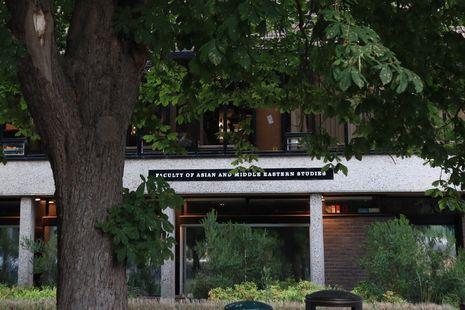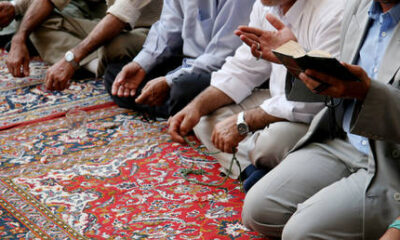Science
Cambridge Project Revives Legacy of Forgotten Sanskrit Scholars

A new research initiative led by Cambridge University aims to uncover the rich history of Sanskrit scholarship in colonial India. The project focuses on the contributions of local scholars, known as “pundits,” who preserved India’s classical literary traditions despite the British colonial influence. Researchers argue that the period between the seventeenth and nineteenth centuries was marked by a vibrant intellectual landscape, contrary to the belief that British expansion stifled Sanskrit learning.
The five-year project, funded by the Arts and Humanities Research Council (AHRC), will undertake an extensive survey of significant scholarly sites in the Kaveri Delta region of Tamil Nadu. This area was once a major centre for Sanskrit studies, with hundreds of scholars operating from rural Brahmin settlements known as agrahāra and monasteries referred to as maṭha.
Exploring the Lives of Unsung Scholars
According to Dr. Jonathan Duquette, the project’s lead investigator from Cambridge’s Faculty of Asian and Middle Eastern Studies, many of these scholars were “literary geniuses” whose contributions have been largely forgotten. “There were historically significant figures, but many people in India don’t know them,” he remarked. The project seeks to study texts that have never been translated or published, potentially uncovering works unknown to both Western and Indian scholarship.
These Brahmin settlements flourished from the fourteenth century, particularly during the reign of the Maratha Bhonsle dynasty between 1650 and 1800. Scholars received land grants that were exempt from tax, allowing them the security to pursue intellectual and artistic endeavors. In return, many celebrated their patrons through poetry and plays. For instance, Shahaji Bhonsle, a ruler and poet of the seventeenth century, is often depicted in Sanskrit texts as both a generous benefactor and an accomplished lover.
Mapping Intellectual Networks
Dr. Duquette and his team aim to identify at least twenty key settlements that played a crucial role in Sanskrit scholarship. Their research will link these scholars to temples, monasteries, and royal courts through a combination of archival research and field visits. The team plans to explore the remaining villages and engage with descendants of the original scholars.
“These settlements have been in decline since the early twentieth century,” Dr. Duquette noted. “Many Brahmins have moved away, and buildings have been sold, but some descendants remain. We want to understand their legacy and make it better known.” He emphasized that there is a common misconception that Sanskrit culture was limited to royal courts and urban centres. “Our project will show that it also had a vibrant life in the countryside, engaging in dialogue with Tamil scholarship,” he added.
Titled ‘Beyond the Court,’ this initiative reflects a broader effort by Cambridge’s Faculty of Asian and Middle Eastern Studies to enhance research in Sanskrit and pre-modern Indo-Persian studies. As the project unfolds, it aims to shed light on an overlooked chapter of India’s cultural history, offering a richer understanding of the intellectual currents that shaped the region.
-

 World1 month ago
World1 month agoCoronation Street’s Shocking Murder Twist Reveals Family Secrets
-

 Entertainment1 month ago
Entertainment1 month agoAndrew Pierce Confirms Departure from ITV’s Good Morning Britain
-

 Entertainment5 months ago
Entertainment5 months agoKate Garraway Sells £2 Million Home Amid Financial Struggles
-

 Entertainment4 months ago
Entertainment4 months agoAnn Ming Reflects on ITV’s ‘I Fought the Law’ Drama
-

 World2 months ago
World2 months agoBailey Announces Heartbreaking Split from Rebecca After Reunion
-

 Entertainment1 month ago
Entertainment1 month agoDavid Jason and Nicholas Lyndhurst Eye Reunion for Only Fools Anniversary
-

 Entertainment2 months ago
Entertainment2 months agoCoronation Street Fans React as Todd Faces Heartbreaking Choice
-

 Health4 months ago
Health4 months agoKatie Price Faces New Health Concerns After Cancer Symptoms Resurface
-

 Entertainment1 month ago
Entertainment1 month agoBradley Walsh Sparks Strictly Come Dancing Hosting Speculation
-

 Entertainment1 month ago
Entertainment1 month agoTwo Stars Evicted from I’m A Celebrity Just Days Before Finale
-

 Entertainment4 months ago
Entertainment4 months agoCoronation Street’s Carl Webster Faces Trouble with New Affairs
-

 World1 month ago
World1 month agoKevin Sinfield Exceeds Fundraising Goal Ahead of Final Marathons





















